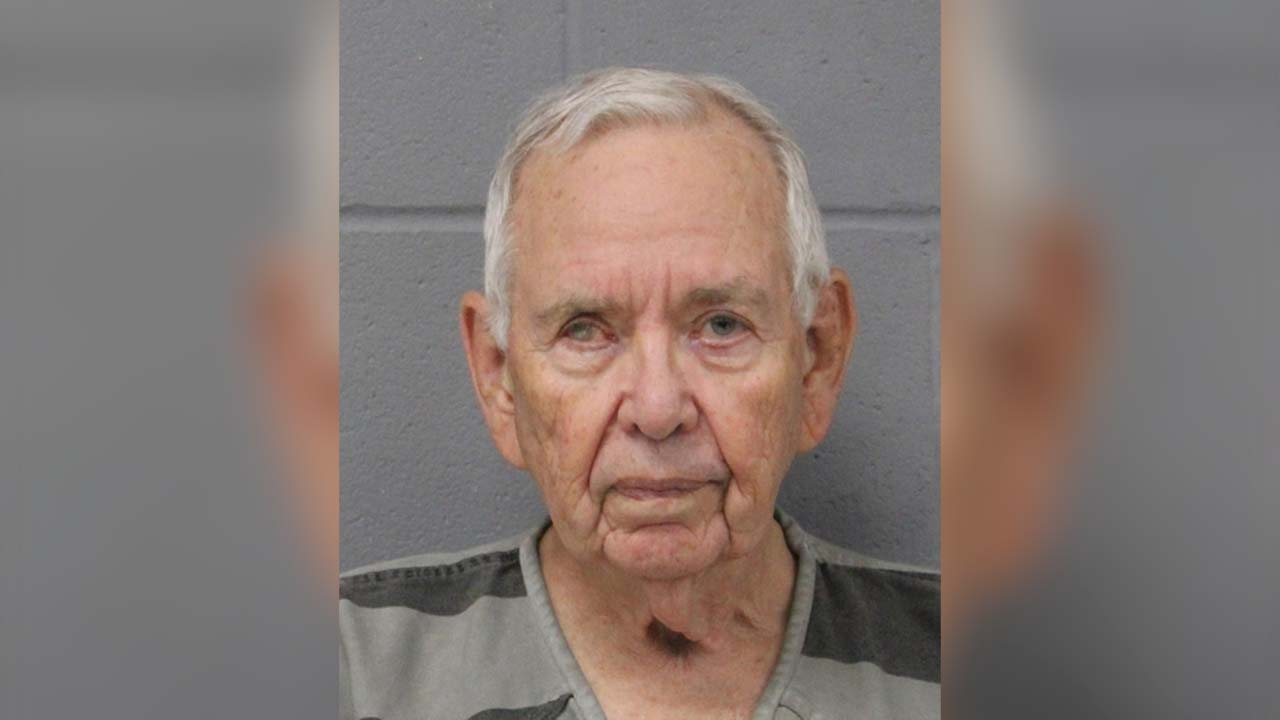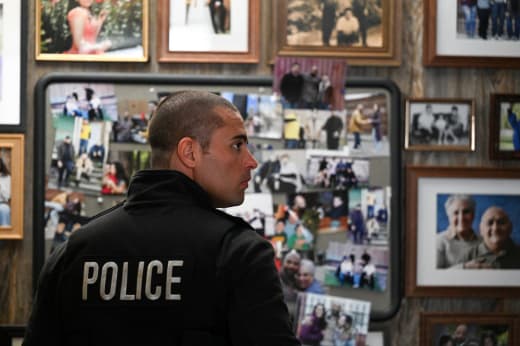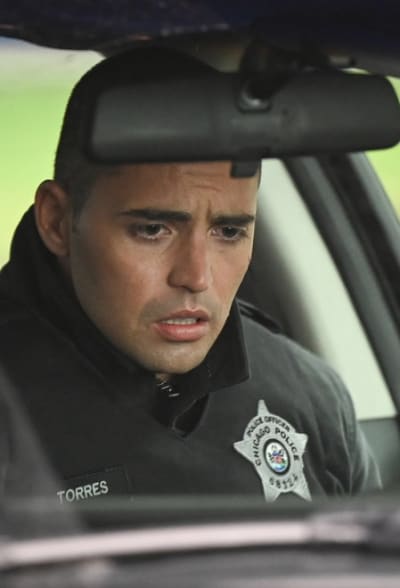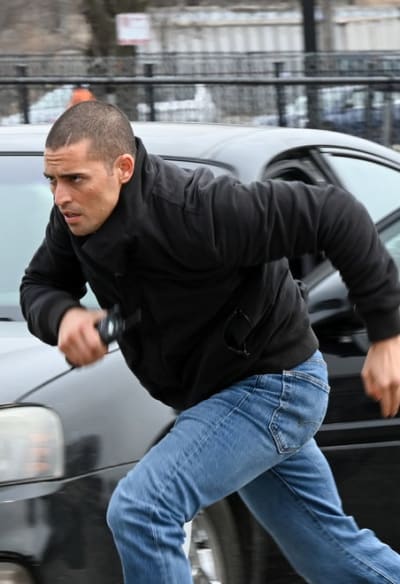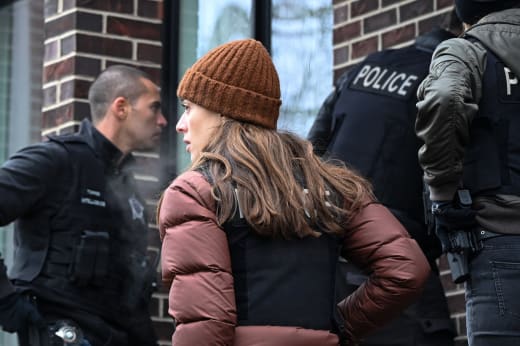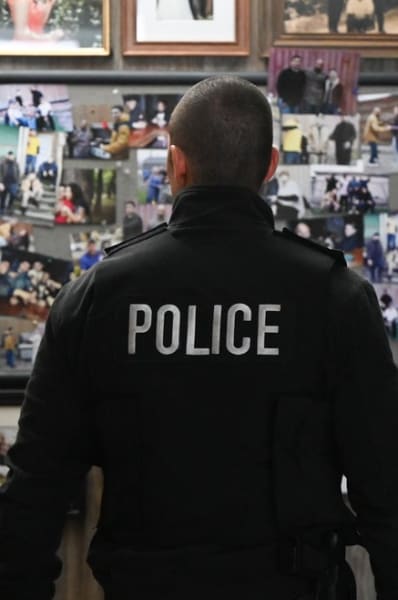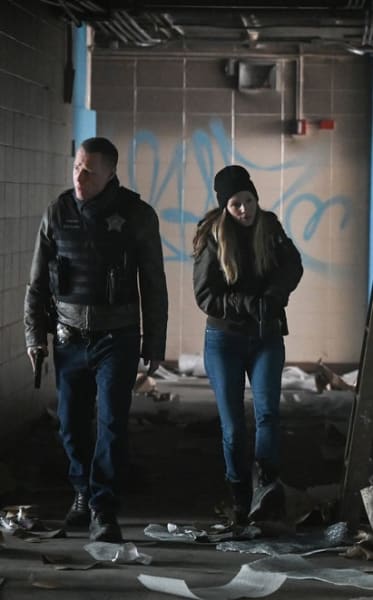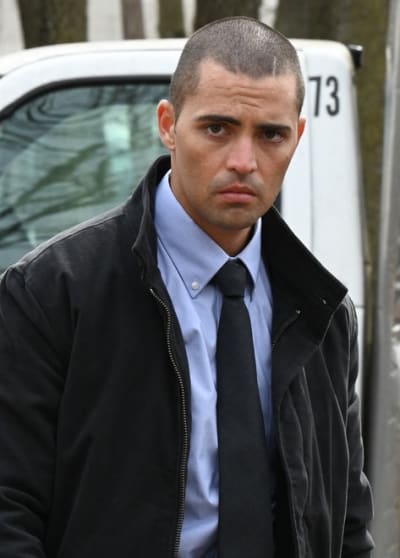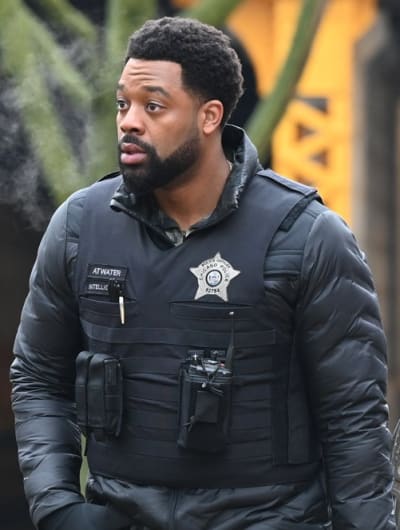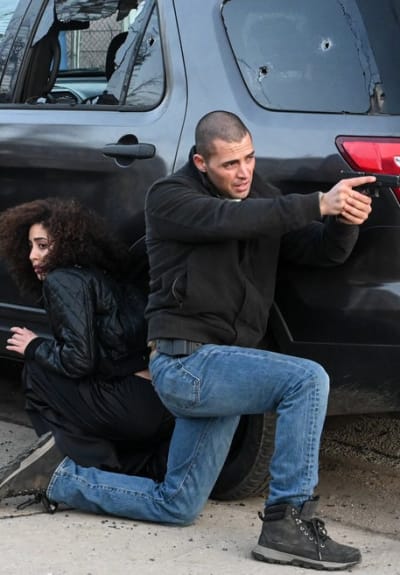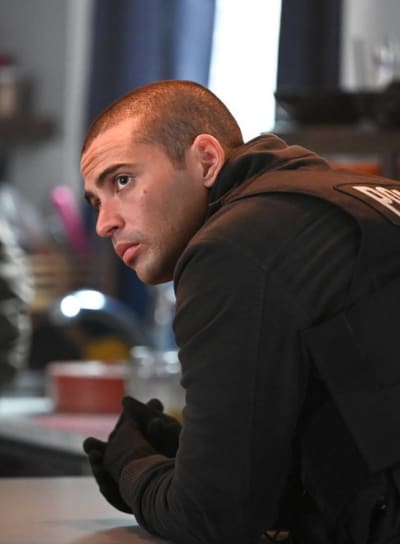Benjamin Aguilar Levy continues to be a bright spot and welcome addition to this series. It’s always exciting to peel back some layers on this new character.
That said, Chicago PD Season 10 Episode 21 was a confusing, underwhelming, redundant hour.
I will be brutally honest with you guys; I didn’t know what was happening for most of the hour.
It was time for a Torres-centric, and goodness knows those can typically be great. He’s not only a fascinating character, but he’s still new and mysterious, so they can explore a treasure trove with him as we and the team continue to get to know him better.
But was this the strongest Torres-centric they’ve produced this season? No. It wasn’t for lack of trying on Aguilar’s part, who is always captivating to watch regardless of what’s happening.
Yes, I adore the guy, and it probably sounds repetitive at this point, but it’s no less true.
But the case was overall a weak one and incredibly confusing. Frankly, if not for the similar sentiment shared with other viewers while live-tweeting, I would’ve assumed I was just tired, and things were going over my head.
The problem is that they never really laid out what the case was in the first place. We jumped into some action with Torres finding a note on his car, which somehow led him to another vehicle with a dying man in it.
And next thing you know, they were pushing this narrative that Torres had ties to Juan, who died, and we had to solve this murder and maybe other things.
They threw so many random names at us, including referencing the same character with two different ones, which truly didn’t help with the convolution.
And somewhere along the way, Torres’ ex, or was she his former crush, or whatever, was connected to Navarro, the person who killed Juan for some reason and also a drug dealer or something.
Even if you find something, even if you make something up, I know you got a dirty cop on your crew.
Navarro
I don’t know. It took most of the installment to grasp what the case was supposed to be about, and there’s an 80% chance some of us probably never did.
The hour retreads some things from Torres’ previous centrics, adding a bit more background to his history and telling us the same history at once.
At least, it seemed we had already known some of these things about Torres before, but maybe we didn’t. Or was it just that the team didn’t?
Torres’ disturbing connection to the dead man that prompted the “dirty cop” claims was that he used to be an enforcer for this man and did horrible things and hurt many people.
Of course, this arose after his time spent in juvie for putting his stepfather in a wheelchair for beating his mother.
It makes sense, and it also felt as if we already surmised that Torres had a sordid past and did some things in their troubled neighborhood to protect his mother.
They presented this enforcer thing as if it was supposed to be this huge shocker, but it didn’t feel that way, perhaps because it was in line with what we already knew or could read between the lines about anyway.
We also heard this story that he had waterboarded and killed someone named Paco. But they had already pulled a similar stunt of feeding us this seemingly disturbing thing that Torres did only to psych us out when it wasn’t as it seemed.
How long can you hold your breath?
Torres
It’s the same thing they pulled when Halstead found out the context behind how Torres went to juvie for assault. And frankly, just like the first time, there was zero doubt that Torres was on the up and up.
But it didn’t stop them from throwing out red herrings or making things awkward when we had Torres freaking out that his past would get exposed to his unit.
The problem is that it didn’t feel like something they wouldn’t have already known to some degree before. It also implies that Torres is naive enough not to think that all the other characters have their own respective pasts.
And on that note, it makes you wonder if Voight’s own reputation no longer exists. For most of the series, we’ve known that Voight has half the city believing that HE’S a dirty cop and the department too.
Hailey: I know you’re still new to us, but if you need something, I’ll be there, okay? Is there anything else I should know about this case?
Dante: No, but thank you.
Is this something Torres never heard any whispers about before joining this elite unit with vaguely shady people? As someone who grew up on the other side of the law, did Torres never hear the slightest whispers about Voight at all?
If Torres knew anything about Intelligence and its past, he probably wouldn’t have been so paranoid about losing his job because of his history.
And wasn’t the whole reason he got chosen in the first place because of his history? So much of the concept behind this case and the motivations for Torres collapse in on itself.
They then teased this idea that Torres could be some rendition of a baby Voight with his bordering-on unhinged interrogation tactics of Navarro’s henchman.
I beat people for him. I did terrible things, unforgivable things, but I never waterboarded anyone.
Torres
And for a bit, it felt as if we’d have yet another scenario where two of the most dicey characters, Voight and Hailey, would be involved with covering up another felony for one of their own. By this point, they’re both pros at being the cause of or being involved in things like this.
But instead, we had Voight watching and listening in as Torres did his best Voight rendition of the cage, using his reputation to get the guy to talk.
Aguilar delivered some damn near Joker-level of maniacal action at some point.
It was an unusual turn for the character in that they’re starting to assign bits and pieces of the other characters to him, as if he’s the sponge of the unit, pulling from those around him.
It’s something offputting about projecting Voight qualities on Torres. It’s not to say that it isn’t entertaining, but it’s also not the turn for the character that one would desire either.
But they tried to pull it back again by the installment’s end, particularly with the hints of Torres’ faith and this newfound understanding of why he wants to do right and atone for his past by serving his community as a cop.
And there’s good potential and content in that. The religious tones aren’t something they’ve touched on much or at all in this series or their line of work, and it’s a piece of his identity that could be intriguing to cover in some capacity.
They started the hour with Torres attending a christening, the baptism of a baby; its sins getting washed away as it begins its new life. And the water was a theme that cropped up again with the waterboarding.
The price Torres paid to be free from his criminal era was waterboarding. Water was the beginning of his new life too. And he’s atoning for his sins even if he can’t be thoroughly cleansed of them.
And it’s also the tactic used within the case as he danced with his former lifestyle as an enforcer.
But Torres has been making the rounds of bonding in little ways with each team member, and his first real connection with Voight is through this.
Voight sees shades of himself in Torres with some of his actions, and we can only imagine he’s filed away the Enforcer component. One can only imagine how that’ll be used in its way… it’s something that also folds into Ruzek’s role in the unit.
We saw remnants of Hailey’s connection with Torres, which especially felt suitable given the bond they’ve built and his role in determining that she was missing.
Torres is finding his way in this family and starting to understand what that looks like, including Voight’s motto of “tell me the truth so I can lie for you (protect you).
But aside from Voight, there’s a redundancy to Torres’ storyline that mirrors Atwater, too.
We have almost the exact same situation with a disenfranchised community resenting and loathing Torres’ involvement in law enforcement.
Torres: My team doesn’t know about me and Oriza, and when they do, I’ll lose my job.
Mia: I won’t say anything. I’m not the one who betrays people I love.
We get the same situation with a woman not only involved in criminal matters but finding themselves on the opposite side of the law, forcing Torres (like Atwater) to do his diligence as a cop during a case jeopardizing the relationship.
We get a similar vibe with Torres’ job as an officer costing him a romantic relationship and contributing to issues with women. It all felt a bit recycled.
And while Torres’ past is compelling and can broaden the scope of storylines and explore new avenues or expand his characterization and offer something different, it also runs the risk of getting too cyclical.
Torres’ specific past and what they can do with that brims with potential, BUT if not done right, it errs on the side of being a mishmash of stereotypes; they leaned further into the Latin gangbanger and violent Brown man thing when they didn’t need to do that.
Torres’ criminal past sprinkled with his poor kid from the hood and disappointment to the people and community thing could become his rendition of Atwater’s Black vs. Blue storylines they beat to death.
I hope they can reel that in to avoid falling into that same pattern.
Over to you, Chicago PD Fanatics.
What did you think of this installment? Were you excited that we learned more about Torres? Sound off below.
You can watch Chicago PD online here via TV Fanatic.
Jasmine Blu is a senior staff writer for TV Fanatic. She is an insomniac who spends late nights and early mornings binge-watching way too many shows and binge-drinking way too much tea. Her eclectic taste makes her an unpredictable viewer with an appreciation for complex characters, diverse representation, dynamic duos, compelling stories, and guilty pleasures. You’ll definitely find her obsessively live-tweeting, waxing poetic, and chatting up fellow Fanatics and readers. Follow her on Twitter.

